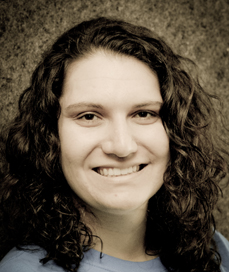Natalie Eisner
 Why computer engineering at Penn?
Why computer engineering at Penn?
I view my Penn Engineering education as the foundational knowledge to answer the questions I have about the world around me, and the skills to change it. I chose computer engineering specifically because, as a freshman, when I looked at the upper-level classes on the curriculum planning guides for each major, the descriptions seemed the most interesting. The combination between electrical engineering and computer science topics as well as the large number of hands-on, project-based classes appealed to me as well.
What would you say is your favorite computer engineering class?
My favorite class so far has been Andre DeHon’s ESE 370 course. It was extremely technically challenging and really allowed me to delve into some complex questions about computer architecture and optimization. I also enjoyed that it was a small class with only 12 students and that Professor DeHon took the time to answer each and every one of our questions so that everyone had a clear understanding. ESE 370 taught me problem-solving and computational design skills that have proved useful in all of my other classes.
How would you describe the computer engineering program to friends or family who aren’t familiar with it?
Computer engineers work at the intersection of hardware and software. Not only can I program an application, but I can build the computer I’m going to program on as well. Computer engineers tackle challenges on a wide range of topics, from increasing your smartphone battery life to making your computer run faster.
What do you think it takes to be a “successful” computer engineer?
I came to Penn not knowing how to code at all, but coding is a language that you can learn as long as you enjoy thinking about these types of problems. Now that I’m past the general math and science requirements of freshman year, it’s rewarding to be exploring topics that are at the core of computer engineering. If you already knew everything, then you wouldn’t be coming to college, so do what works for you. Know that you can be successful. The field is so broad that if you’re passionate about learning and these things interest you then there is no reason why you can’t be successful.
What internships have you done? (Or for seniors, what are you doing next year?)
Last year I competed in PennApps, a 48-hour hackathon where people form teams and create projects. The environment really drives creativity and is a lot of fun, so I definitely recommend trying it at least once (even if you’re a newbie at coding). Anyway, at PennApps my partner and I created a virtual closet, which can recommend outfits based on the weather and color theory. We won the prize Best E-Commerce Platform, one of the sponsor prizes, from ShopYourWay.com. I worked for them for the summer, and it was a great experience learning to write production-level code.
What other activities do you participate in at Penn?
I am very involved in a bunch of different activities at Penn. I am President of the Engineering Deans’ Advisory Board, which serves as a liaison between the faculty, students, and administration. I am Secretary and Webmaster for the Society of Women Engineers. I ran a social impact hackathon with the Penn Society for International Development. I am also a member of Alpha Omega Epsilon, Penn’s only engineering sorority. Most recently, Penn students have started a club called Penn Wireless, which focuses on wireless and radio communication, and I earned my HAM radio technician operator license with their guidance.
